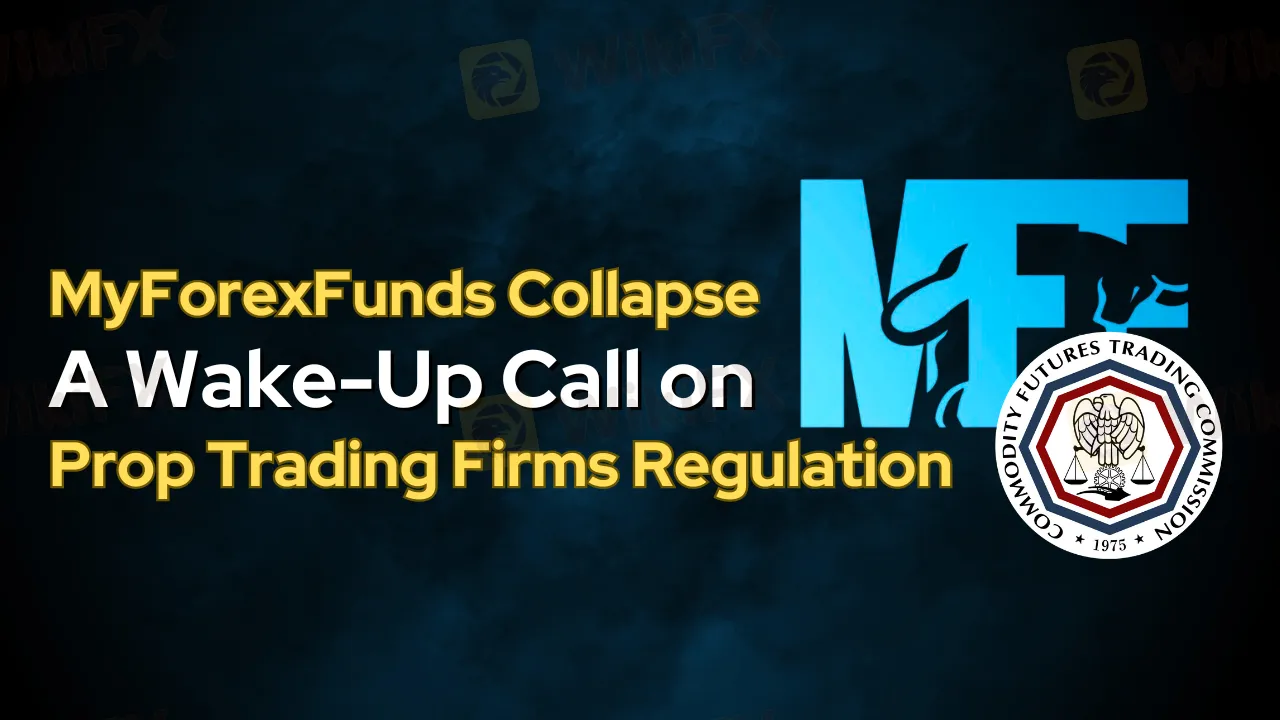MyForexFunds Collapse: A Wake-Up Call on Prop Trading Firms Regulation
Abstract:MyForexFunds collapse exposes shady practices in Forex trading. Learn about the allegations, Ponzi-like schemes, and why choosing the right prop trading firm is crucial. Stay informed with this cautionary tale.

Introduction
The collapse of MyForexFunds (MFF) has sent shockwaves across the Forex trading community. Recently, the Commodity Futures Trading Commission (CFTC) has filed serious allegations against the company, freezing its assets for scrutiny. The case against MFF has reignited conversations around the importance of prop trading firms' regulation and the different business models they employ.
The Rise and Fall of MyForexFunds
Once considered one of the biggest prop trading firms in the market, MyForexFunds promised traders the chance to trade with large funded accounts. The company managed to attract 135,000 customers since November 2021 and amassed at least $310 million in trader's fees. However, despite its massive appeal, the firm came under fire from the CFTC for operating with a flawed business model.
The Allegations
The CFTC charges against MyForexFunds primarily revolve around their false claims of a win-win situation for traders. They allegedly misled customers by stating, “We only make money when you do,” which turned out to be untrue. In reality, the firm acted as the counterparty to all trades taken by its customers, minimizing the chance of them making any profits. This was accomplished through tactics like misleading advertisements, manipulating trade commissions, and deploying custom software to introduce slippage into trades.

Bee Booking and Ponzi Schemes
MFF's business model was what's known in industry jargon as “bee booking,” a model wherein the losses of one group of traders finance the wins of another. Bee booking is considered a red flag, often associated with Ponzi or Pyramid-like schemes. Simply put, MyForexFunds used the fees from losing traders to pay out to winning traders, creating an unsustainable business model.
The Importance of Choosing the Right Prop Trading Firm
The downfall of MyForexFunds serves as a dire warning for traders to be cautious when selecting a prop trading firm. Traders should look for firms that use reliable business models, like the A-Book model, which offers more transparency and is regulated by established financial authorities.
What Traders Can Do Now
If you're a trader who has been affected by the MFF collapse, it's essential to stay updated on the CFTC's actions and consider seeking legal advice. Meanwhile, it's vital for all traders to perform due diligence when choosing a prop trading firm to prevent falling into a similar trap.
Summary
The CFTC charges against MyForexFunds have shed light on the darker corners of the Forex funds market. The allegations indicate a deliberate attempt by MFF to prevent traders from profiting, using a business model akin to a Ponzi scheme. This incident serves as a cautionary tale, stressing the importance of prop trading firms' regulation and the need for traders to be vigilant when choosing a platform.
Stay updated on the latest news, by installing the WikiFX App on your smartphone.
Download the App here: https://www.wikifx.com/en/download.html

Read more

At midnight hour,bing on the bubbly
Let's welcome the arrival of the new year. Embrace the unknown, the best is yet to come. In 2025,WikiFX will continuously promote the healthy development of the industry

WikiFX Review: Is HYCM still reliable in 2024?
HYCM is an online broker offering a wide variety of market instruments. WikiFX reviewed HYCM a few years ago. However, we wonder if this broker is still reliable in 2024 and the coming 2025. WikiFX has made a comprehension review of this broker to help you better understand the truth.

Top 5 Forex Brokers in the Philippines at the End of 2024
The forex market in the Philippines has seen significant growth over the past few years, with a wide range of international and local brokers offering their services to Filipino traders.

10 Blacklisted Brokers on WikiFX: Unveiling the Rogue Players
As 2024 draws to a close, the financial landscape remains fraught with deceptive practices and fraudulent brokers. WikiFX, a trusted broker regulatory query platform, has compiled a list of the 10 blacklisted brokers for December. These entities have earned their spot due to violations such as being unregulated, engaging in scamming activities, or forbidding client withdrawals. Here's a closer look at the brokers to avoid at all costs.
WikiFX Broker
Latest News
Japan to Take Action to Stabilize the Yen
Ringgit Remains Flat Amid Holidays, US Debt Concerns Loom
Taurex: Is it Safe to Invest?
WikiEXPO Global Expert Interview: Loretta Joseph——Unlock the forefront of digital finance
Vietnamese Police Bust $1.2 Million Crypto Fraud Case
XTB Receives Licenses to Operate in Indonesia & UAE
SEBI Bans Big "Finfluencers for Misleading Investors"
WikiFX New Year Bash: Chance to Win 70 USDT
Malaysia’s Securities Commission Enforces Ban on Bybit & Its CEO
Will Gold Shine Brighter in 2025?
Rate Calc

